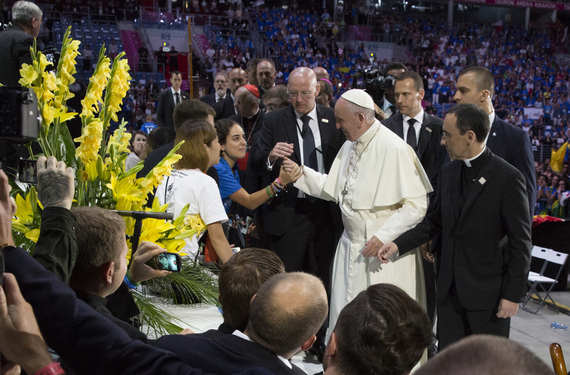Pope Francis greets volunteers at World Youth Day in Krakow, Poland.
Photo credits: CNS.
Last week, about 2 million young people -- including nearly 4,000 Canadians -- gathered in Poland to hear Pope Francis speak at Catholic World Youth Day. Even if, like me, you're neither young nor Catholic, it is nevertheless an event with interesting ramifications for Canada and our politics.
World Youth Day happens every few years, and this was the first edition since the Pope released his encyclical Laudato Si' in 2015, which focused on environmental and ecological issues. It is a bold document: Pope Francis was unambiguous about the role humans play in driving climate change, and also about the need for changes in energy policy, in modes of production and consumption, and in the established structures of power.
For the youth who gathered in the height of summer, climate change is hard to ignore. This year will be the hottest one they -- or any person alive -- has ever seen, with each of the first six months of 2016 breaking temperature records. Here in Canada, the Fort McMurray wildfires have become the costliest natural disaster in Canadian history, and scientists tell us that we can expect a warming world to produce more and more extreme weather events.
Pope Francis hasn't been timid in speaking about these issues. In September, after publishing the aforementioned encyclical, he became the first pontiff to address both houses of the U.S. Congress. His remarks challenged Republicans and Democrats alike to question whether their politics -- their most powerful tool to change the world for the better -- truly reflected their faiths where the environment is concerned.
Many young Catholics are paying attention to his example. Last week, two associations representing 10 million Catholic students worldwide called on their governments to invest in their futures by creating more of the clean energy jobs that they want to work in. Youth also made their voices heard at a conference about the encyclical, which was attended by high-ranking church officials and Poland's conservative minister of the environment. And Laudato Si' may be the first encyclical to inspire a hashtag, as people took to social media to pledge concrete actions they will take to live more sustainably.
A year ago, I publicly pondered whether the Pope's encyclical would shake up established ways of thinking about climate change. So far, the momentum seems to be on the side of action. In Canada, governments at all levels are putting more energy into climate policy than we've seen in many years. And that makes World Youth Day, where we can see both religious and generational dynamics at play, all the more fascinating.
There is a long and rich history of faith communities helping to drive progressive political causes, including in Canada. Pope Francis' leadership on issues like climate change may revitalize and expand that impulse in the Catholic community -- which is Canada's largest religious group, with more than 12 million believers.
The result may not be overnight change, but the changes we do see will be reinforced by generational turnover. There is tremendous unity among young people on this issue: Canadians under the age of 35 are the most likely to be concerned about climate change, and to support the development of clean energy solutions.
Politicians are learning that lesson. It's telling that Preston Manning, my fellow parliamentarian and an elder statesman of Canadian conservatives, has taken a strong interest in environmental issues. We disagree on many things -- including the appropriate policy responses to climate change -- but we both see that the era of denying or downplaying this issue is over. Dealing with climate change has always been a moral obligation, but it's increasingly becoming a political necessity as well.
The young Catholics who gathered in Poland to celebrate their faith, and the gift of our common world, may be a positive sign of what's to come. The challenges that climate change poses are common to us all. Let's hope that soon we'll be able to say the same about the solutions.
